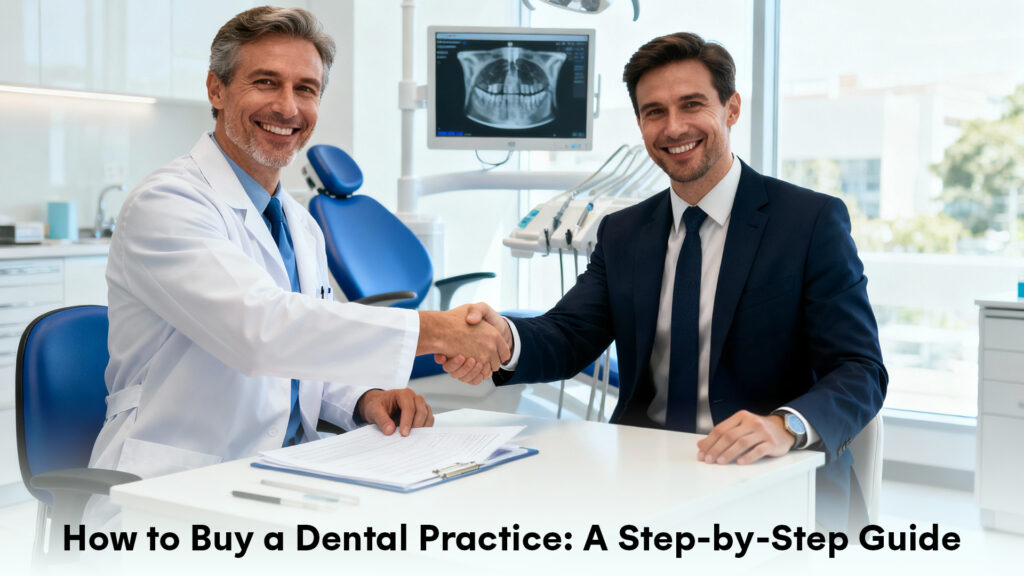How to Buy a Dental Practice: A Step-by-Step Guide

Buying a dental practice is one of the most significant milestones in a dentist’s career. Whether you’re a recent graduate ready to take the leap into ownership or an experienced professional expanding your network, the process involves careful planning, financial clarity, and due diligence.
In this comprehensive guide, we’ll walk you through how to buy a dental practice, step by step, and explore key factors such as cost, considerations, checklists, and how to find the right opportunity.
How Much Does It Cost to Buy a Dental Practice
The cost of buying a dental practice can vary widely based on location, size, patient base, equipment, and goodwill value. On average, a dental practice in the U.S. may range from $300,000 to over $1 million.
Key Cost Factors
| Factor | Description | Typical Impact |
| Practice Size & Location | Urban clinics cost more than suburban or rural practices. | High |
| Annual Revenue | Practices are often valued at 60–80% of annual collections. | Very High |
| Equipment & Technology | Modernized digital setups increase value. | Medium |
| Staff & Retention | Experienced staff adds continuity and goodwill. | Medium |
| Lease or Property Ownership | Affects long-term costs and negotiation leverage. | Medium |
Pro Tip: Partner with ProMed Financial to assess fair market value and identify financing options that fit your goals. Our expert advisors specialize in buying and selling dental practices across the U.S.

Things to Consider When Buying a Dental Practice
Buying a practice isn’t just about the price, it’s about fit, potential, and sustainability. Here are the key aspects to evaluate before making an offer:
- Location & Demographics: Analyze patient flow, local competition, and community growth.
- Financial Performance: Review tax returns, production reports, and profit margins for at least the past three years.
- Patient Base: Determine the size, age distribution, and insurance mix of patients.
- Staff and Culture: Meet the existing team to understand morale and retention likelihood.
- Technology & Equipment: Outdated systems might require upgrades, impacting total investment.
- Transition Plan: Understand how the seller plans to hand over patients and operations smoothly.
ProMed Financial offers customized practice valuation and acquisition consulting, helping you uncover hidden costs and negotiation leverage points before signing.
Buying a Dental Practice Checklist
Here’s a simple step-by-step checklist to keep your purchase on track:
- Define Your Goals: Decide on size, specialty, and preferred location.
- Get Pre-Qualified for Financing: Secure approval to strengthen your offers.
- Search for Opportunities: Partner with brokers or financial consultants like ProMed Financial for access to pre-vetted listings.
- Conduct Due Diligence: Review financials, patient data, and compliance records.
- Hire a Dental CPA and Attorney: Ensure financial and legal transparency.
- Negotiate the Deal: Discuss terms, price, and transition support with the seller.
- Finalize Financing: Work with lenders familiar with healthcare transactions.
- Sign & Transition: Close the deal and ensure a seamless ownership handover.
Download Your Free Dental Practice Buying Checklist: Contact ProMed Financial for personalized guidance and access to our downloadable due diligence template.
How to Find a Dental Practice to Buy
Finding the right dental practice is often the toughest step, but with the right strategy, it’s manageable.
1. Use Professional Networks
Reach out to dental associations, alumni groups, and broker listings. Networking with peers often leads to off-market opportunities.
2. Partner with a Broker or Advisor
Financial advisory firms like ProMed Financial connect buyers to verified sellers, simplifying the search process and minimizing risk.
3. Monitor Online Listings
Use online platforms and dental trade sites to discover current listings. Look for practices with transparent data and seller motivation.
4. Visit and Assess in Person
Always schedule in-person visits to assess layout, equipment condition, and staff dynamics.
CTA: Looking for verified dental practices for sale? Explore opportunities through ProMed Financial’s Listings.
Who Can Buy a Dental Practice
In most regions, licensed dentists can purchase and operate a dental practice. However, non-dentists may invest through corporate structures, provided compliance with local laws.
Eligibility Overview
- Licensed Practicing Dentists: Can directly buy and operate.
- Recent Graduates: Must obtain proper licensing and sometimes partner with senior dentists initially.
- DSOs (Dental Support Organizations): May acquire and manage practices under specific regulatory models.
- Investors: In some states, can co-own but not practice dentistry themselves.
Tip: Before proceeding, check your state’s corporate practice laws or consult ProMed Financial’s legal advisory partners to ensure full compliance.
Conclusion
Buying a dental practice is both a financial and professional investment. With proper planning, expert advice, and financial guidance, you can secure a thriving business that matches your long-term goals.
Whether you’re evaluating costs, comparing listings, or finalizing financing, ProMed Financial is your trusted partner, helping dentists buy, sell, and finance dental practices with confidence.
Ready to start your ownership journey? Get a Free Consultation with ProMed Financial today.
FAQs
What’s the first step in buying a dental practice?
Start by defining your goals, specialty, preferred location, and budget. Then, get pre-qualified for financing through an experienced lender like ProMed Financial.
How long does it take to buy a dental practice?
Typically, the process takes 3–6 months, depending on financing, negotiations, and transition complexity.
Do I need a broker to buy a dental practice?
While not mandatory, brokers and financial consultants simplify due diligence, negotiation, and valuation, ensuring you don’t overpay.
Can I buy a dental practice without experience?
Yes, but you’ll need a valid dental license. Many first-time buyers rely on advisors and sellers who provide short-term transition support.

